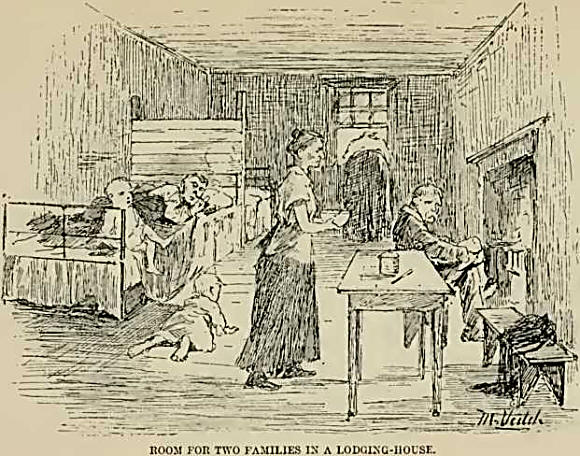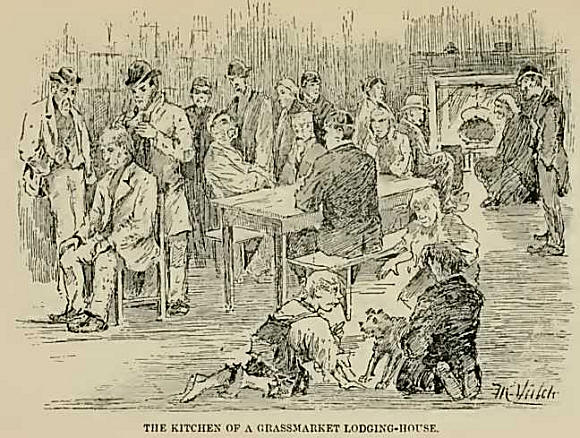|
We come now to a lower
circle in this. Inferno— the third. We have had glimpses of life as it
is to be seen in the one-roomed dwelling of the poor man ; we have also
looked at the conditions of existence a grade further down, where the
system of “furnished lodgings” is in vogue; our next descent is to the
sphere of the common lodging-house. The people who live in common
lodging-houses may be said to be in the very lowest strata of our
population, embracing as they do inferior artisans and labourers,
criminals of all kinds, tramps and beggars; all those pitiable beings,
in fact, who because of misfortune or bad character, have never been
able to gain an independent position in life, but drift about, like
straws in the gutter, a misery to themselves and a constant annoyance
and burden to the community.
Lodging-houses, of
course, differ in degrees of respectability. One house may be noted for
its cleanliness, orderliness, and general good management. Another may
have a bad reputation as a refuge for thieves, and women of questionable
character, and, accordingly, have the eye of the police continually upon
it. A third may be the favourite “howff” of the tramp tribe; while
resident mendicants make a fourth their customary “doss-house.”

Like their reputations,
the internal arrangements of common lodging-houses are after a variety
of patterns. In general, however, they arc planned in this simple and
comprehensive style. From the street a passage, in which there is a
pay-box like a railway booking-office, leads to the general kitchen,
where the lodgers cook and eat their food, and lounge, talk, and smoke.
Upstairs, as many flats as you please, are the bedrooms and dormitories
with the accommodation painted in large letters on the doors. These
rooms may be bedded for any number of people, from two up to forty, or
even more. Some of them arc wonderfully clean — considering the habits
of their occupants: some of them are no tidier than they should be; and
not a few arc execrably dirty.
But what will strike one
as the most notable feature of the sleeping-rooms in common
lodging-houses is the scant attention paid to privacy in the married
quarters. One would expect that in houses licensed by our Magistrates
and under their direct supervision, the bed-rooms would be arranged with
more regard to the dictates of decency than is found in a Zulu kraal or
a Patagonian mud-hut. And this disregard is only emphasised by a
pretence made to preserve the “sacred secrecy” of the family. It is
quite a common thing to see one room occupied by two or three married
couples and their children. The beds are placed end to end, and are
separated only by a board the width of the bed and about the height of a
man. This partition is a mere make-believe, a nominal concession to
propriety, and does not afford the slightest seclusion to any of the
occupants of the room. The obvious pretentiousness of the arrangement
irritates one. The erection of the screen is a tacit admission that
there ought to be seclusion, but one might as well attempt to secure it
by sticking a twopenny Japanese fan between the beds as by putting up
these boards.
The lodgers themselves do
not seem to deprecate this publicity; they move about among each other
without restraint or bashfulness, each family acting as if there were no
strange eyes looking upon them. Such is the effect of habit.

"A lodging-house is no
place for a man who has a wife and bairns. Some of them are perfect
hells, and none of them are heavens,” said a man to us who had had a
long and varied experience of life in these houses. Doubtless this would
be the opinion of most people of similar experience ; yet their efforts
to escape from their baneful surroundings arc seldom attended with
success. The attempt is often made. A man and his wife will leave a
lodging-house they have lived in for some time, saying that they intend
to set up a home of their own. But the chances are that in a few weeks,
or months at the most, they are back again in their old quarters, driven
there by their old enemy, drink. “There are very few of them need be
here at all, if it were not for drink; if it was not for that, they
would have houses of their own,” a Grassmarket lodging-house keeper
remarked to 11s. “They can never gather enough money to enable them to
begin housekeeping; but if they do, they soon break out again, drink up
everything, and come back again worse off than ever. Once they become
accustomed to the lodging-house life they seldom get out of it.”
The kitchen of a
lodging-house is an exceedingly interesting place. There the picturesque
may be studied under conditions not easily found elsewhere. One kitchen
we have in our mind’s eye is representative of most of them. It was a
long, low-roofed room, with a stone floor. At one end there was a big,
old-fashioned fireplace, in which a mighty fire roared and crackled. On
a stool at a corner of the hearth sat a ragged old man toasting a red
herring of powerful odour spitted upon a stick. In front of the fire,
assiduously stirring the contents of a hanging pot, stood a nut-cracker
faced old woman, so bent, so wrinkled, and altogether so “uncanny”
looking, that one would have thought it quite in keeping with her
appearance if she had suddenly vanished up the chimney astride a
broomstick. On benches on either side of the room and around the fire
sat a score or more of the seediest, motliest beings that one could well
gather together. Women in short kirtles, with their bare arms folded or
set akimbo, were “ chaffing ” men with dirty unshaven faces, battered
hats, and garments that an old-clothesman would have nothing to say to.
Some of those dingy lodgers, men and women alike, were smoking ; some
lay asleep on benches, and some sat gazing dreamily into space. Several
unwashed children were disporting themselves with a bandylegged mongrel
dog, which seemed to be the joint possession of the whole colony. In a
corner a man of dilapidated exterior was cutting tlic hair of one of his
“pals,” an operation which drew forth facctious remarks from several of
the onlookers, their humour finding vent in speculating as to where he
got the previous “ crop ” and where lie was likely to get the next one.
It was a Sunday, and
though it was past four o’clock in the afternoon most of the men had
just risen, and were dressing by easy stages. Quite a number of the
lodgers of the house, in fact, did not leave their beds at all; for not
being addicted to the habit of church-going, and finding the Sunday
quietude of the Grassmarkct irksome, they preferred to pass the day in
slumber. Besides, as not unfrequently happens, when a man has not got
anything in the larder, he finds it easier to stifle the complainings of
an empty stomach in bed than in loafing about the streets or sniffing
viands cooking in the kitchen.
In a lodging-house each
one does his own cooking, unless a number of persons agree to cooperate
to save trouble. Every one for himself, however, is the general rule.
But, then, this sort of people don’t go in for elaborate culinary
effects. A bit of bacon fried, a roasted herring, and such easily-cooked
morsels, with a piece of bread, cheese, and tea, form their staple
bill-of-fare.
Each lodger has a small
locker, in which he stows away any property or provisions he may be
possessed of; but, as one man ruefully observed, “they’re no’ o’ much
use, for it’s no’ often that we’ve mair than the smell to lock awa’.”
The charge usually made
in common lodging-houses is 6d. a day for each individual; if a person
stays a whole week he pays only for six days, the seventh day’s lodging
being given free of charge. When, say, two or three families occupy a
room such as the one shown in the sketch, they each pay 4s. a week,
making 8s. or 12s. a week that the proprietor draws for the rent of one
room of insignificant size and wretched furnishings, which consist of
the beds, a table, and a bench or two.
In the Model
Lodging-house in the Grass-market the rates are 4d., 5d., and 6d.,
without a free day on Sunday. Its internal arrangements arc as much
superior to those of the average lodging-house as a well-regulated hotel
surpasses a low cook-shop. The building is large and airy, as clean as a
man-of-war; the bunks are neat and comfortable, the dormitories
admirably ventilated ; and in addition to a large dining hall and a
cooking range, there is a well-appointed reading room.
“Why don’t you prefer to
go to the Model Lodging-house?” we asked a dirty specimen of the tramp
tribe whom we met in one of the least washed “doss-houses” in the city.
“Well, ye see, sir,” he replied, “we havena got the freedom there that
we have here. There arc ower mony rules and regulations in the Model.
Ye’re 110 allowed to lie in your bed a’ day if ye want to, or to gang
aboot as ye like. There arc ower mony men in uniform goin’ aboot for my
taste.” In the estimation of this man, and of his kind, the lousy
freedom of the den he kennelled in was more to be desired than the
cleanliness and regularity of the Model Lodging-house.
There really is a
Bohemianism about the life in a common lodging that suits the tastes of
those restless, careless characters; and in their own way they have
jolly carousals now and again.
One Saturday night, as we
were climbing the stair to a lodging-house noted as a resort of hawkers,
beggars, and street musicians, we heard sounds of uproarious merriment
coming from the kitchen. When we entered we were confronted with a
grotesque scene. The room was filled with a hilarious company,
picturesque in their rags. In the centre of the floor, surrounded by a
laughing, joking, applauding group, were a man and a woman going hard at
an Irish jig, putting as much agility into their toes and heels as if
their reputations depended on their exertions, as no doubt they did. The
room was stiflingly hot, and the boots of the man and the woman were by
no means of dancing-shoe make, but they kept it up without faltering or
flagging for a moment. And right good dancers they were too, not merely
shuffling through with any sort of apology for figures, but whirling,
linking, and setting, all in perfect time and step. Faster and faster
scraped the fiddler, faster and faster twinkled the feet of the dancers,
and louder grew the whooping and applauding of the spectators.
At length the man gave in
and withdrew, but the woman, whose excited eye and whisky-reeking breath
betrayed the secret of her exuberance, vociferously called upon another
partner. Again the jigging began, and soon waxed as furious as ever.
However, despite the whisky and the boisterous cries of encouragement
from the onlookers, the woman’s endurance was eventually exhausted, and,
panting and perspiring, the dancers sank on to a bench. Then came a
singing interlude with violin accompaniment, at the conclusion of which
the flagstones again began to resound with the clatter of swiftly moving
feet.
That night with the jolly
beggars was a glimpse of the bright side of lodging-house life, a brief
lifting of the heavy clouds that overshadow existence there. The normal
conditions, however, are painfully sombre; they arc poverty and hunger,
filth, wretchedness and wickedness, degradation and despair. |

